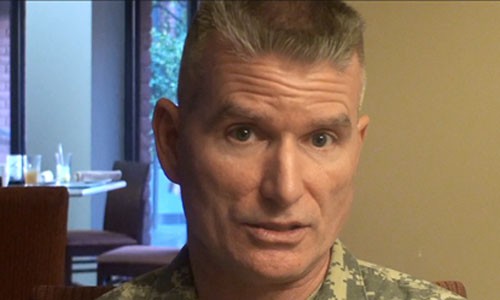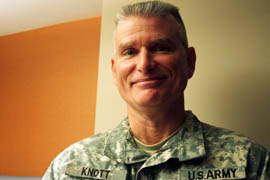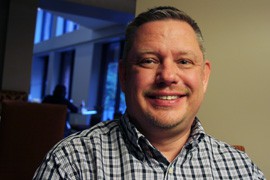Cronkite News has moved to a new home at cronkitenews.azpbs.org. Use this site to search archives from 2011 to May 2015. You can search the new site for current stories.
Army partners with ASU to train soldiers in sustainability
TEMPE – In Afghanistan, an Army outpost’s use of solar power means fewer convoys trucking in fuel and vulnerable to attack.
At Fort Bragg in North Carolina, setting aside land to help a once-endangered bird species created a buffer between outside development and a vital training area.
These and other sustainable practices conserve money and energy and protect the environment. But they also safeguard soldiers’ lives and the Army’s mission, leaders say.
With that in mind, the Army, Army National Guard and Army Reserve have joined with Arizona State University’s School of Sustainability to create a graduate certificate program in sustainability leadership.
The five-course program, launched in early January, is offered online so Army personnel around the world can enroll. Courses are six to eight weeks long and the program takes approximately a year to complete.
“Now, when you talk to a general about sustainability, he doesn’t think, ‘Oh, that’s bugs and bunnies – that’s tree-hugger stuff,’” said Lt. Col. Joseph Knott, sustainability and energy program manager for the Army National Guard. “The soldiers – who are what we most care about – are actually living and coming back to their loved ones because of things we’re doing the right way.”
Army environmental specialists and engineers collaborated with ASU educators to develop a program addressing the Army’s sustainability objectives. The certification program is geared toward soldiers as well as civilian workers employed by the Army.
ASU was a natural choice because of its advanced sustainability program, Knott said.
Renewable energy is an important topic to address in order to keep soldiers safe, said Rob Melnick, executive dean of ASU’s Global Institute of Sustainability.
“If we’re at war in Afghanistan and we have to bring tanks of petroleum over land, that may be dangerous to soldiers,” he said. “Then obviously it’s going to be to the military’s advantage from a safety and emission point of view to be able to substitute some type of technology – renewable, sustainable energy – that’s not going to be putting trucks and the drivers in harm’s way.”
Beginning with basic sustainability principles, the courses include readings and videos, and students post replies online and respond to others’ posts. At the end of each unit, students are required to present on the lessons.
“I did one of my presentations on, ‘If you’re going to change the world, you have to start at home – my military home,’” said Keith Braun, deputy director of environmental management for the Missouri National Guard.
Braun said he walked through his office and evaluated the facility’s energy management to determine which practices worked and which ones didn’t.
A 2009 executive order mandated that federal agencies reduce their greenhouse gas emissions, reduce their impact on the environment and increase water and energy conservation. The Army kicked off its sustainability campaign in 2010 and has been publishing annual sustainability reports since 2007.
Michael O’Hanlon, a national security specialist and fellow at the Brookings Institution, said the push for sustainability by the Department of Defense, specifically energy-resource management, isn’t yet enough to impact energy use in the nation.
“We have to think of it as a catalyst,” O’Hanlon said. “Because it’s not a big enough overall user of energy in the United States, that even if the DOD gets a little more efficient at home that’s going to make a huge dent in the nation’s energy use.”
While Knott said he hopes the program will eventually expand to other branches of the armed forces, understanding the importance of sustainability is the first priority.
“Otherwise, we won’t get off step one,” he said. “If you don’t know what it is, how can they make it a new part of their everyday lives?”










